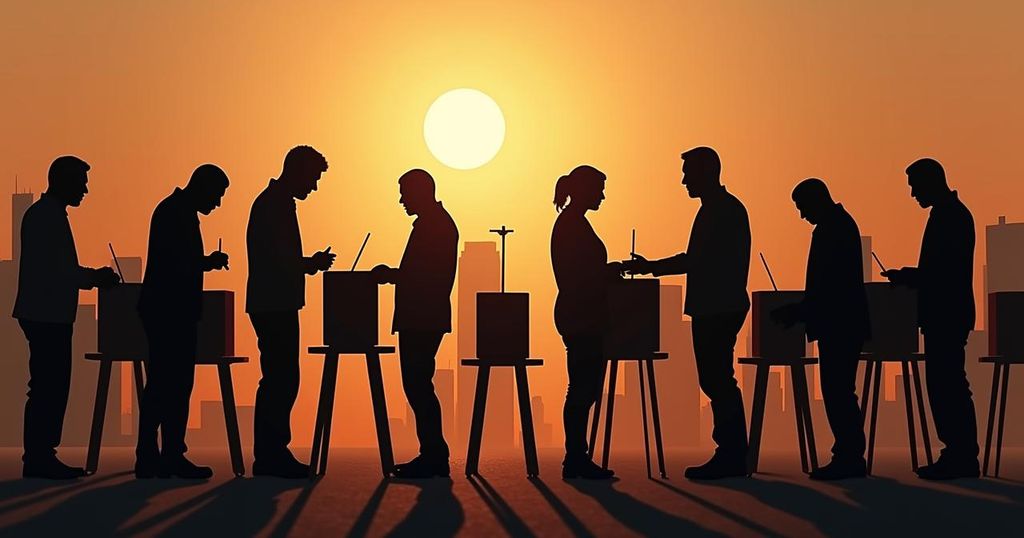Tunisia is poised to conduct a presidential election that critics argue will lack fairness and freedom. President Kais Saied aims for re-election after consolidating significant power and suppressing opposition through disqualifications and arrests. As the political climate grows increasingly autocratic, many fear this election marks the decline of democracy in Tunisia, once heralded as a beacon of hope in the region following the Arab Spring.
Tunisia is holding a presidential election that many critics and analysts believe will lack the essential qualities of a fair and free process, marking a troubling milestone in the country’s ongoing political turmoil following the Arab Spring. As Tunisians head to the polls, there are claims that this election may signify the demise of democracy in a nation that had previously inspired democratic uprisings across the Middle East following mass protests in 2011. While Tunisia initially appeared to navigate its post-revolutionary phase without significant upheaval, it has increasingly shifted towards autocratic governance, driven in part by economic challenges that have led many citizens to seek a strong leader. Sarah Yerkes, a senior fellow at the Carnegie Middle East Program, noted, “If you just look at the broad form of it, it appears to be a normal, potentially democratic election. But once you start to peel the layers off, it becomes very clear that this election is nowhere close to free or fair.” President Kais Saied, who won a landslide victory in 2019, has worked steadily to consolidate power, reversing the democratic achievements made since the Arab Spring. He orchestrated a significant power grab in July 2021 by dismissing the prime minister, suspending parliament, and asserting the right to govern by decree. The passage of a new constitution in 2022 further solidified his control, eliminating judicial independence and curtailing the legislative branch. Citizens appear disengaged and apathetic, as demonstrated by low voter turnout in the 2022 constitutional referendum, indicating growing disillusionment with the electoral process. Despite the appearance of a contested election with seventeen candidates, opposition members point out that many have been disqualified or imprisoned. Notably, the election commission, which has seen its independence diminished under Saied’s regime, failed to respond to inquiries regarding the disqualification of candidates. Yerkes emphasizes, “In the end, everyone who tried to run has been disqualified or thrown in jail, or both,” with the exception of one candidate. Crackdowns on dissent have intensified, with numerous opposition figures imprisoned, including Rachid Ghannouchi, the leader of the main opposition party, who is serving a three-year sentence on foreign funding charges. His imprisonment has led to calls for solidarity among opposition supporters, exemplified by public sentiment that Ayachi Zammel, an imprisoned candidate, symbolizes the resistance against Saied’s autocratic tendencies. Supporters of Saied argue that he has enacted significant reforms beneficial to the Tunisian populace, despite ongoing economic adversity comprising high inflation and slow growth. Some citizens express hope for change, while others exhibit skepticism about the president’s ability to uplift the economy and foster a truly democratic environment. This election starkly contrasts with prior electoral processes deemed fair by impartial observers. Tunisia currently faces a dire situation, with over 170 individuals detained for political reasons, predominantly from the Ennahda party. Recent amendments to the election laws have further eroded democratic frameworks, as Saied has asserted greater control over the electoral commission—an institution whose integrity is critical to the electoral process. Overall, as Tunisia’s political landscape evolves, observers and critics remain wary about what lies ahead for a nation that once symbolized hope for democracy in the region. As Maher Madhioub, an Ennahda politician, expressed, the president represents a significant disappointment for a generation of Tunisians who once admired his legal expertise and promised reforms.
Tunisia’s presidential election occurs against a backdrop of escalating authoritarianism following a decade marked by democratic gains after the Arab Spring protests in 2011. The political environment has deteriorated since Kais Saied’s election in 2019, as he has systematically concentrated power and undermined judicial independence, raising concerns about the potential erosion of democracy. Critics argue that the political landscape has become increasingly hostile to dissent, with many opposition figures being silenced or imprisoned, reflecting a worrying trend in the region where other nations have experienced democratic backsliding amidst political unrest. The international community watches closely as Tunisia navigates this critical period, which could determine its future trajectory.
The upcoming presidential election in Tunisia is perceived by many as a pivotal moment that could signify the end of the nation’s democratic transition, with President Kais Saied consolidating power and systematically undermining opposition. The disqualification of candidates, political repression, and amendments to electoral laws raise serious concerns about the integrity of the electoral process. As citizens prepare to cast their votes, the future of Tunisia remains uncertain, and the hope for a genuine democratic culture is increasingly challenged by authoritarian practices.
Original Source: www.washingtonpost.com






